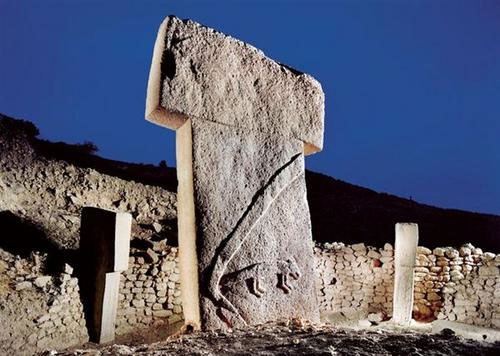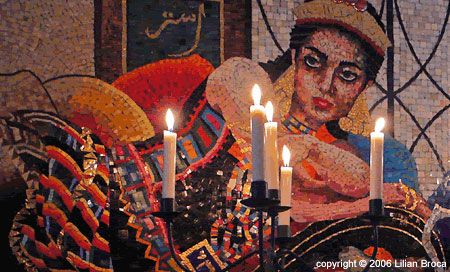Mar
25
2010
or Jesus in the Synagogue of Satan
I am jealous for you with godly jealousy. For I have betrothed you to one husband, that I may present you as a chaste virgin to Christ. But I fear, lest somehow, as the serpent deceived Eve by his craftiness, so your minds may be corrupted from the simplicity that is in Christ. For if he who comes preaches another Jesus whom we have not preached, or if you receive a different spirit which you have not received, or a different gospel which you have not accepted — you may well put up with it! (2 Corinthians 11:2-4)
Read Fighting Over the Children and The Finger of God before you read this post.

John’s account concerning the woman caught in adultery highlights the satanic nature of legalism. The garden of Eden is not replayed here; rather, it is a sequel.
You must be logged in to see the rest of this post.
Join now for a year for $15!
The woman stands in the midst (a phrase that occurs twice). She is the Altar of Incense, the fragrant “army.” The scribes and Pharisees are the false Lampstand, standing in for satan as his body. He is, after all, their father. They bring no male lover to be condemned. She has been enticed and now stands accused. Her sin is one of wandering astray. Their sin is high-handed.
Continue reading
Comments Off | tags: Feasts, Genesis, John, Lampstand, Satan, Worship | posted in Biblical Theology
Mar
10
2010

or Playing Poison with Genesis 1
You know how it is when you read one of your favourite theologians and they come up with a real clanger? It’s yes, wow, yes, I’m with you, and then the train of thought jumps the tracks—at least as far as you, the reader, are concerned. It’s like me reading a good Presbyterian who without any warning flies off the wall and marries chalk and cheese to prove the Bible teaches infant baptism. Or it’s you reading this blog watching me fly off the wall every now and then (but it’s all completely logical in my mind—believe me! Bully is never wrong!)
Anyhow, J. L. Vaughan, a “Covenant Creationist” on the AV forum pointed out this article by Brian Godawa, who is both a theologian and a screenwriter. I have featured Brian’s articles on the Abrahamic Covenant, Matthew 24 and Daniel 9 on my old The Last Days page. He is logical and easy to understand. And he’s a preterist. But then he jumps the tracks (as far as I’m concerned) and goes and parrots this drivel:
Continue reading
7 comments | tags: Add new tag, Compromise, Covenant Creationism, Genesis, Tas Walker | posted in Creation
Mar
1
2010
The Bible vindicated yet again, by a site that dwarfs Pompeii

Ben Witherington comments on the unearthing of a huge temple complex and its relevance to Genesis:
This temple lies west of the Biblical plain called Haran and is only 20 miles from the Syrian border. This places it right in the fertile crescent which begins below modern day Iraq, includings the Tigris and Euphrates rivers and winds its way north through Syria and into eastern Turkey. This is the world not only of Genesis, but of the great Anatolian civilization of the Hittites (yes those Hittites as in Uriah the Hittite—husband of Bathsheba)… Klaus Schmidt and his team of Kurdish diggers have uncovered an enormous temple complex that pre-dates the Great Pyramids by some 7,000 years and Stonehenge by at least 6,000 years!… After 12 years of hard work, Schmidt has found at least four temple complexes. The radar scans of the area indicate there is a huge amount more to uncover here. And Schmidt has a thesis about this temple complex—here is a short excerpt from the Newsweek article on this:
“Schmidt’s thesis is simple and bold: it was the urge to worship that brought mankind together in the very first urban conglomerations. The need to build and maintain this temple, he says, drove the builders to seek stable food sources, like grains and animals that could be domesticated, and then to settle down to guard their new way of life. The temple begat the city.”
The importance of this find for Biblical thinking is this—the Bible says that from the outset, human beings were created in God’s image. Human beings were religious creatures from Day One. Archaeologists and sociologists have long dismissed this theory saying organized religion comes much later in the game than the beginning of civilization and city building. As Ian Holder director of Stanford’s prestigous archaeology program says— this is a game changer. Indeed, it changes everything experts in the Neolithic era have been thinking. Schmidt is saying that religion is the cause of civilization, not the result of it. Towns were built to be near the Temple complex. Agriculture was undertaken to feed those living there and supply the temple complex, and so on. The first instincts of humans were to put religion first. Maybe there is more to that Genesis story than some have been willing to think or admit. Maybe human beings are inherently homo religiosis.
Continue reading
Comments Off | tags: Archaeology, Ben Witherington, Genesis, The flood | posted in Creation, Quotes
Feb
19
2010

or Smells Like Holy Spirit
A friend recently gave me a unique gift. With some difficulty and great expense, he sourced the ingredients for the anointing oil of the Aaronic priesthood and I was the grateful recipient of a small, blue vial.
The scent of the oil is intoxicating. You breathe it in and in some strange way you can “taste” it as it goes down. It is extremely complex and yet a single fragrance. Continue reading
Comments Off | tags: Ark of the Covenant, Atonement, Covenant Theology, Creation Week, David, Esther, Ezekiel, Genesis, Greater Eve, Incense Altar, James Jordan, Peter Leithart, Resurrection, Saul, Tabernacle | posted in Biblical Theology, Quotes, The Last Days, The Restoration Era
Feb
5
2010

The Pharisees’ call for miracles from Jesus was a sign of immaturity. As the story of the patriarchs demonstrates, the growing maturity of the people of God is illustrated in less of a need for proofs. The Word is enough. Miracles are occurring around the world in places where the gospel is new and faith needs assurance. In the West, genuine miracles of this nature seldom occur. Is it due to a lack of faith or a call to greater faith? We have had the Scriptures forever, and the childish desire for (and manufacturing of) miracles, betrays a reversion to childhood.
Continue reading
2 comments | tags: Abraham, Genesis, Jacob, James Jordan, Joseph, Maturity, Spiritual Growth | posted in Biblical Theology, Christian Life, Quotes
Jan
31
2010

How are we to understand the need for Jacob to wrestle not only with Laban, but also with the angel of the Lord?
Abraham was given a miraculous son and his greatest test was to face the loss of that promised son. Jacob’s test was a similar loss of what had been gained through unity with God by Covenant. Both Abraham and Jacob had learned that they were not lords themselves but stewards under the Lord. Their authority was delegated to them. They were “Word incarnate.” Theirs was the authority of a head servant. They were Covenant vassals, and what was truly precious was their faithful relationship to God under this Covenant. Continue reading
Comments Off | tags: Abraham, Covenant Theology, Genesis, Jacob | posted in Biblical Theology, Totus Christus
Jan
18
2010

or The Sick Fix of Quick Bricks
God had repeated His promises of land and people to Isaac, but it was to Jacob that God revealed He was going to build the true Babelic tower in the Promised Land. With his head on a rough stone, Jacob saw angels ascending and descending on a stairway to heaven, a ziggurat, a constructed holy mountain, between God and man. As with Eve, the Lord would build it out of flesh and blood—Jacob’s offspring—a living Tabernacle made of precious stones mined from the Land.
Continue reading
Comments Off | tags: Babel, Compromise, Daniel, Genesis, Jacob, Nimrod, Pharaoh, Tabernacles, Temple | posted in Biblical Theology
Jan
16
2010

Then He said, “Do not draw near this place. Take your sandals off your feet, for the place where you stand is holy ground.” Exodus 3:5
A sacrifice is literally a nearbringing. James Jordan suggests that instead of sacrifice or offering, a better translation of the word qorban would be “nearbringing”:
“The English “sacrifice” tends to connote the idea of giving something up for someone else. That has little if anything to do with qorban. “Offering” tends to connote a gift, which again has nothing to do with qorban. The word means to draw near, to get into close relationship with someone, and it is used only in relationship to God. We do not worship God by giving Him anything, for He needs nothing. We do not worship God by giving up anything good, for He is the one who has given us all good things. We worship God by drawing near to Him.” [1]
The first nearbringing was the marriage Covenant between Adam and Eve. There was blood when Adam was “divided” so that Eve might be “constructed.” [2] And we can assume that when Adam and Eve were first physically united there was also blood.
Continue reading
Comments Off | tags: Genesis, James Jordan, Peter Leithart | posted in Biblical Theology, Quotes, The Last Days
Jan
14
2010

Here’s the first of my replies to Brian’s contentions. I’ve put a 50 Failed Predictions? link under featured articles so all posts in this series are easy to find.
1. The bodies and souls of the wicked were not thrown into Gehenna (Matt. 10: 28).
Gehenna was the Valley of Hinnom. It was the site of the child sacrifices before the exile. The Lord atoned for this shedding of innocent blood to false gods by filling it with the bodies of the idolaters—a mass grave. Then the Land was ceremonially clean. Fittingly, Ge-Hinnom was the site of Jeremiah’s terrifying threats in Jeremiah 18, which Paul draws upon in Romans 9:21.
Continue reading
10 comments | tags: Genesis, Herod, Tabernacle, Tophet | posted in Biblical Theology, The Last Days
Jan
13
2010

“Peter came to Him and said, ‘Lord, how often shall my brother sin against me, and I forgive him? Up to seven times?’ Jesus said to him, ‘I do not say to you, up to seven times, but up to seventy times seven.’” (Matthew 18:21-22)
Genesis 4 seems to contain two “feast” cycles. Near the end of the first, at “Atonement”, the Lord set a mark upon Cain to protect him from vengeance. As on the Day of Covering after Adam’s sin in Eden, the full weight of the law was withheld. Cain complained that his “liability” was greater than he could bear. Cain was covered but he still went from the presence of the Lord, as the goat which carried the sins into the wilderness. It seems Cain despised mercy.
Just as the Lord and the Land were two witnesses against his crime, he now fled from the face of the Lord and the face of the Land. Only the High Priest could face God, standing in the Veil, the firmament between heaven and earth. Abel was the true facebread, the authorised priest. [1]
Continue reading
6 comments | tags: Abel, Abraham, AD70, Atonement, Azal, Cain, Esau, Genesis, Herod, Jacob, Lamech, The flood | posted in Biblical Theology, The Last Days



































